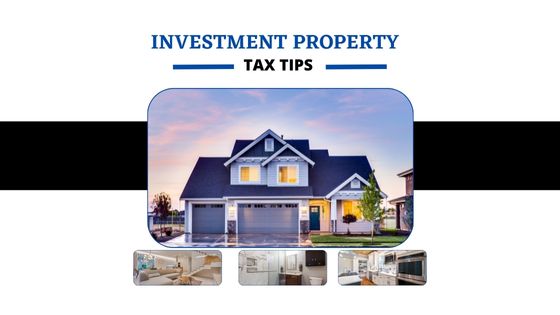
12 Awesome Ways to Reduce Tax on your Investment Property
Posted on |
Prefer to jump ahead to a section?
You can use the Table of Contents below
- Loan Interest
- Council rate
- Strata fees
- Land Tax
- Building depreciation
- Adverting cost
- Appliance depreciation
- Repairs and Maintenance
- Insurance, Bookkeeping costs, Agent fees, Travel costs, Legal expenses
- Pest control
- Capital Gains Tax (CGT) discount
- Negative Gearing
There are several ways to reduce tax on your Investment Property for Landlords to minimise their tax bills, and deductions can make the difference between negative and positive cash flows. Investors, however, should note that their property can only be deducted for periods when the property was genuinely rented during the relevant financial period.
The deduction can only cover any portion of an expense used for business purposes. Ensure you keep records of these expenses to prove they were incurred for managing & maintaining an investment property.
To help you understand how these deductions work, here are the top tax deduction tips for investment properties. Let’s explore ways to reduce tax on your Investment Property.
1. Loan Interest
Ways to reduce tax on your Investment Property – As an investment property owner, you are eligible to claim the interest charged on the loan along with any bank fees applicable for servicing the loan. When you incur interest and fees on a loan, you can deduct the interest and fees on your tax return. However, you cannot deduct repayments on the principal amount and cannot claim interest on the entire loan. Always check with your tax agent to reconfirm the exact amount you are eligible to claim.
2. Council Rate
The ATO allows you to deduct council rates in the financial year they are paid; you can only claim these deductions for periods when the investment property is rented. Tax deductibility is dependent on when the investment property was rented. Let us understand with an example if the investment property was rented for 270 days of the year, and you only claim the deduction for 270 days. So you will be eligible to claim 73% (270/365) of the total amount you paid in investment property council rates for that period. This is one of the best ways to reduce tax on your Investment Property.
3. Strata fees
One of the ways to reduce tax on your Investment Property through the cost of body corporate fees can be claimed if your property is in a strata title. However, if these fees include maintenance and gardening expenses, you cannot claim them separately.
4. Land Tax
One of the ways to reduce tax on your Investment Property is through land tax. Land tax can be deducted from your investment property if you have a rented dwelling; however, the level of tax varies significantly between states and when you can claim the deduction. Before claiming the deduction, please discuss this with a tax adviser or appropriate government department.
5. Building Depreciation
Building depreciation is the most prevalent way to reduce tax on your Investment Property. If your investment property were built after 16 Sep 1987, the original construction cost would be eligible for a 2.5% annual deduction for 40 years. So if your building was constructed for $300,000 in 1990, you could claim a depreciation deduction of $7500 a year until 2030. In a case when a property was built before 16 Sep 1987, its original construction costs will not be eligible for depreciation.
Furthermore, depreciation deduction can not be claimed on a renovation before 27 Feb 1992; however, if structural improvements were made after this date, you are qualified for a depreciation deduction of 2.5% for the 40 years.
Please note that this claim deduction only applies if the property was rented or available.
6. Adverting cost
Whether leasing your property or re-letting it, you must market it carefully. You can claim adverting expenses against your income in the year you make them. You can deduct your advertising expense in the same year you paid.
7. Appliance depreciation
Another smart way to reduce tax on your Investment Property is through appliance depreciation. An appliance like dishwashers, washing machines, air conditioners, stoves and other assets are eligible for depreciation deduction.
These appliances depreciate over time, just as the building itself does, and can be depreciated over several years, usually based on how long they last. However, landlords can only claim depreciation on assets that meet specific criteria.
Suppose you own a residential renal property purchased before 7.30 pm on 09 July 2017, and the depreciating asset is installed by 12 July 2017 then, you can claim a deduction for both new and second-hand depreciation assets. The exception is if the asset was either newly built or significantly renovated.
8. Repairs and Maintenance
Maintining your property not only helps to keep the property up to date but is also a way to reduce tax on your Investment Property. Suppose your repairs are directly related to wear and tear, such as replacing a few broken roof tiles after a storm or fixing an appliance. In that case, you are entitled to claim the costs of hiring a professional to handle a repair as an immediate deduction.
If, however, you replace an appliance and the cost of this replacement is not deductible as capital expenditure, you may deduct the cost as depreciation over the asset’s life. Similarly, if you install a new fence or carpet to enhance your property’s value, you must deduct the cost as a capital work deduction at 2.5% a year for 40 years.
9. Insurance, Bookkeeping costs, Agent fees, Travel costs, Legal expenses
A most common way to reduce tax on your Investment Property is through admin expenses. You are eligible to claim the cost of insuring investment property as well as Bookkeeping costs, Agent fees, Travel costs, and any legal expenses.
10. Pest control
As an investment property landlord, you are eligible to claim a deduction for the cost of hiring a professional pest controller.
11. Capital Gains Tax (CGT) discount
The capital Gains Tax (CGT) discount strategy is a way to reduce tax on your Investment Property. The tax you must pay depends on whether you made a capital gain or a loss in selling your investment property.
When you sell your investment property and make a profit, you must pay capital gain tax on this profit. If you buy and sell the property within 12 months, the net gain is added to your taxable income, which increases your tax bill. Nonetheless, you may be eligible for a 50% capital gain discount if you held onto the investment property for at least a year before selling it. In that case, you may only need to incorporate half of the capital gain into your tax return.
12. Negative Gearing
A negative gearing strategy is a way to reduce tax on your Investment Property. Landlords can deduct any losses they incur on an investment property from their taxable income under the current government regulation. In other words, if an investment property rental income is less than its expenses, the investor can deduct this loss from taxable income, Hence paying less tax.
** Please note that you should always seek professional advice about your circumstances before acting on the information in this article. The article is to provide a general overview of things to consider and does not constitute professional advice.
Please check out article on “How I can reduce taxable income this year”


